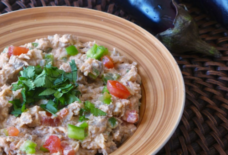Hala Alyan’s new poetry book, The Twenty-Ninth Year, a diaristic sketch of a woman’s goodbye to her twenties, is an elegy to escape and oblivion, driven by a deep loss that has sent the author on an endless road, searching for love and meaning, far from her birthplace of Palestine.
“The exile knows his bones are 206 instruments,” Alyan writes in “Transcend.” “There is a song in each one.”
The poems in The Twenty Ninth Year are like so many sorrowful songs, broken up like exquisite corpses, surrealist postcards from a nomad’s wanderings, dark confessions of a battered soul.
“Exile is strangely compelling to think about but terrible to experience,” Edward Said wrote in his essay “Reflections on Exile.” “It is the unhealable rift forced between a human being and a native place, between the self and its true home: its essential sadness can never be surmounted. And while it is true that literature and history contain heroic, romantic, glorious, even triumphant episodes in an exile’s life, these are no more than efforts meant to overcome the crippling sorrow of estrangement.”
Alyan, who is now thirty and works as a psychologist, travels from Texas highways to Syrian airports, passes through Kuwaiti boats and New York apartments, New Orleans rivers and Paris hostels, borders, and brothels, accompanied by her family, lovers, and friends. She takes us on a relentless adventure of whisky intoxication, pill-ingesting, forced starvation, chain-smoking, fleeting sexual encounters with women and men, stolen cocaine, kleptomania, cigarette burns, blades, guns, and bullets. Fighting anorexia, alcoholism, addiction and heartbreak, the woman in the poems is desperate for something she cannot find – a glimmer of beauty, a dream of home, a sense of peace, God.
In “Armadillo,” a poem about her parent’s romance, she writes: “What do we do with heartache? Tow it.”
Alyan’s work follows an ancestral tradition of nomadic elegy in Arabic poetry. Since pre-Islamic times, as regional borders fluctuated, poets were active voices for their tribes and societies. As the postcolonial era and regional conflict triggered mass migrations from Palestine to Iraq and Lebanon, new forms of poetry emerged to reflect uprooted identities. The great poets of Arabic modernism, including the apolitical Adonis (from Syria) and the engaged Mahmoud Darwish (from Palestine), wrote about never-ending travels, existential anxiety and the quest for home.
In 2003, in “Celebrating Childhood,” Adonis reminisced about his village of Al Qassabin:
I was born in a village/ Small and secretive like a womb/ I never left it./ I love the ocean not the shores.
But Alyan’s beautiful jumble of words and images reimagines the nomadic poet less as a hero, a troubadour speaking for a people. Her voyage takes place on a more intimate, subversive level. Her provocative affront to the taboos imposed upon Arab and Muslim women, her shattering of the shame that surrounds our sexualities and bodies, her frank display of abuse, obscenity and failure, liberates the genre from its grandiosity, imagining a gospel of the mundane that reflects the mortality and fragility in each and every one of us.
On marriage, she writes in “Gospel: Insomnia”:
By wife I meant hotel towels I steal to scream into.
I married that white cotton. I married a man and wore a white dress.
It has been five months and every morning I marry a white pill.
The man dreams of computer hearts. I count the sirens.
And, through the fractured sentences and illogical juxtapositions, the strange scenarios and mad imagination, a nightmare emerges: the suffering of a Palestinian people torn from their land, condemned to a lifetime of alienation and longing.
Alyan is part of a new generation of radical Palestinian women crafting bold new narratives, more than half a century after the Nakba (the ‘disaster’, when over 700,000 Palestinians were forced to flee their homes by Israelis, most never coming back). Like sculptor and artist Jumana Manna, artist Emily Jacir, filmmaker Maysaloun Hamoud, rapper Shadia Mansour, and the voices of a wider feminist activist movement in Palestine and the Arab world, she has transformed the moments of everyday life and diasporic paths into allegories of an eternal gender and political struggle.
In “The Worst Ghosts,” she writes:
Palestine, a name that means
The worst ghosts are the ones that don’t come back
But the shadow of Palestine — the memory of a dream homeland — is almighty, engulfing lives and overshadowing hopes, tracking us even in our furthest escapes.









